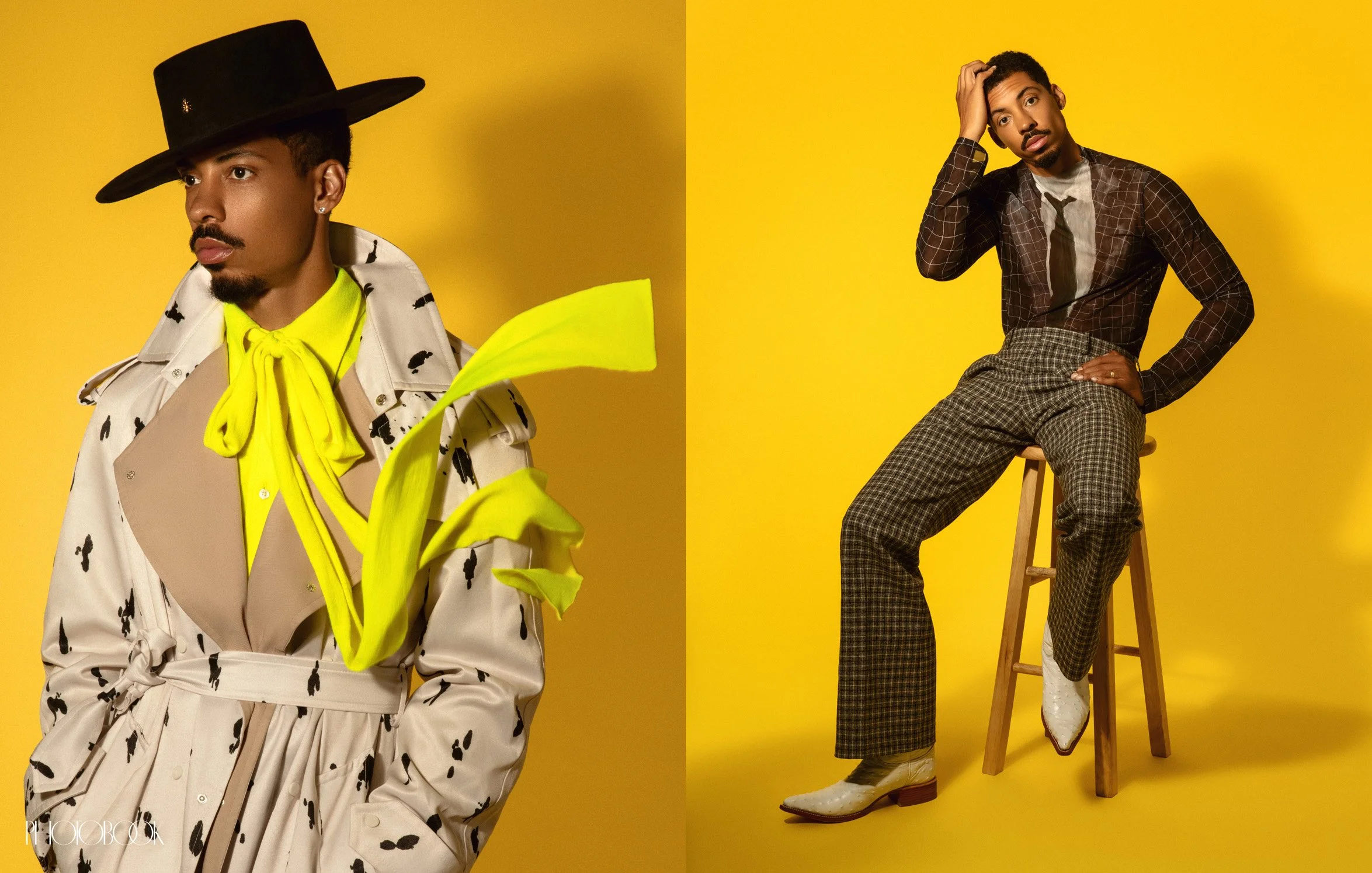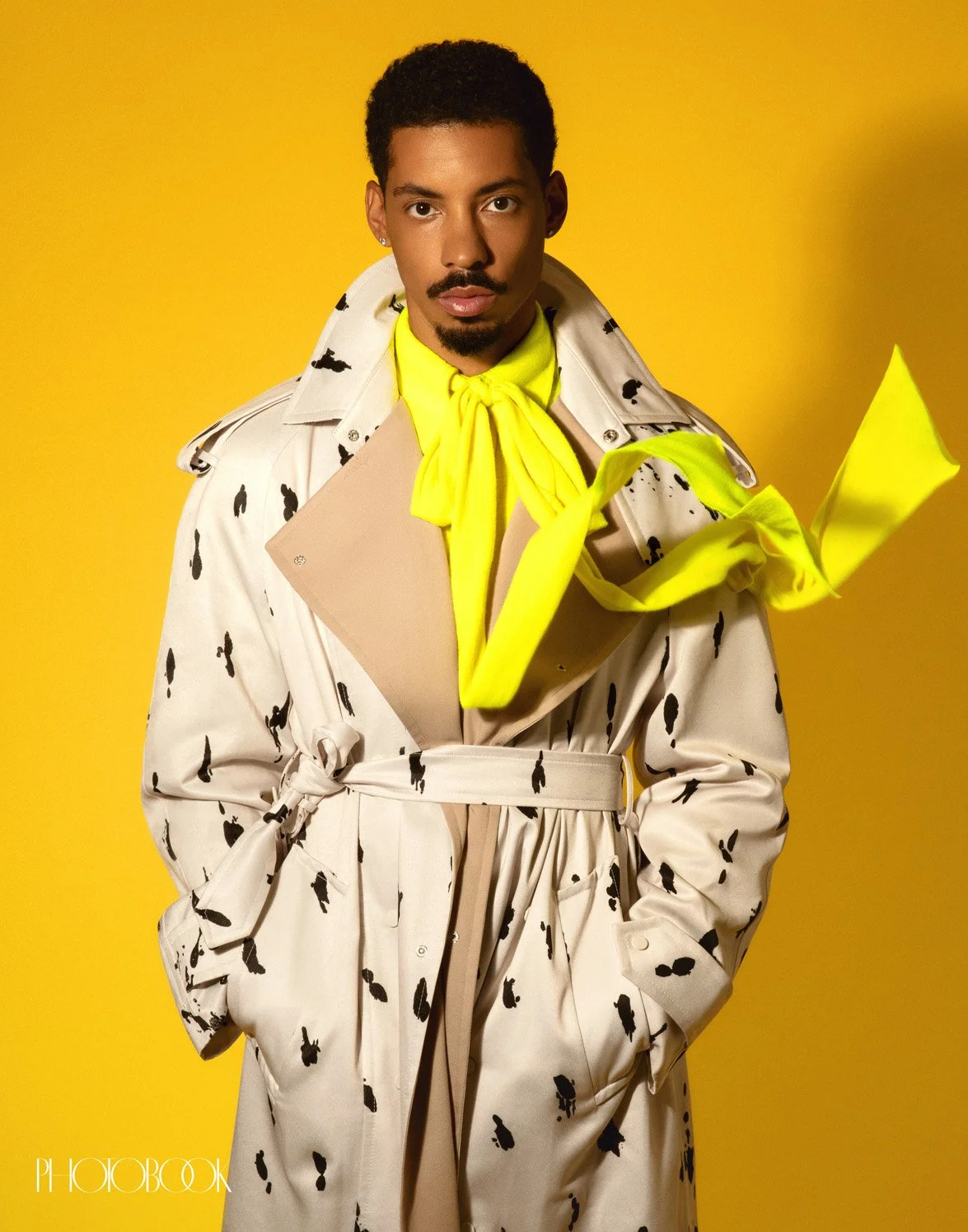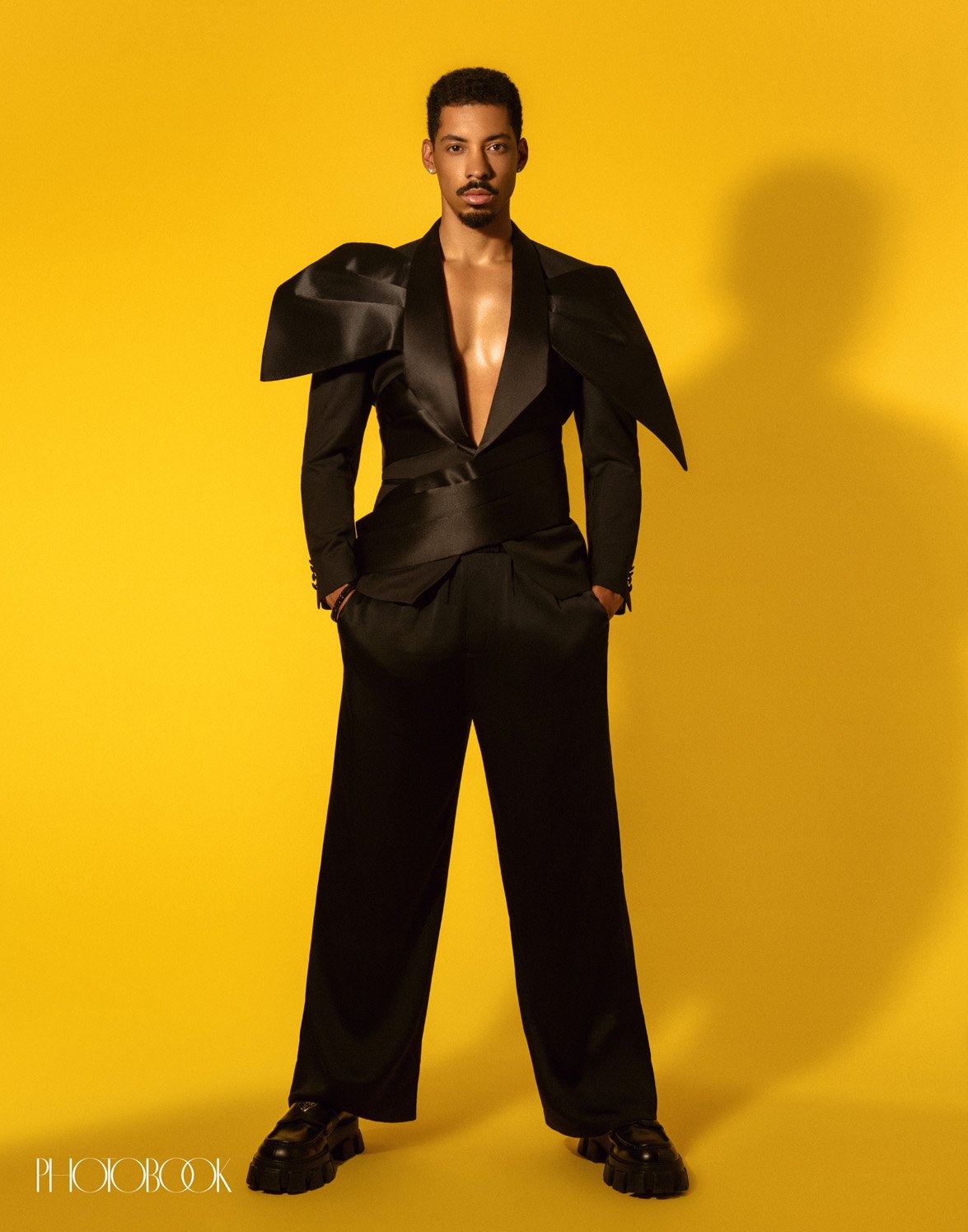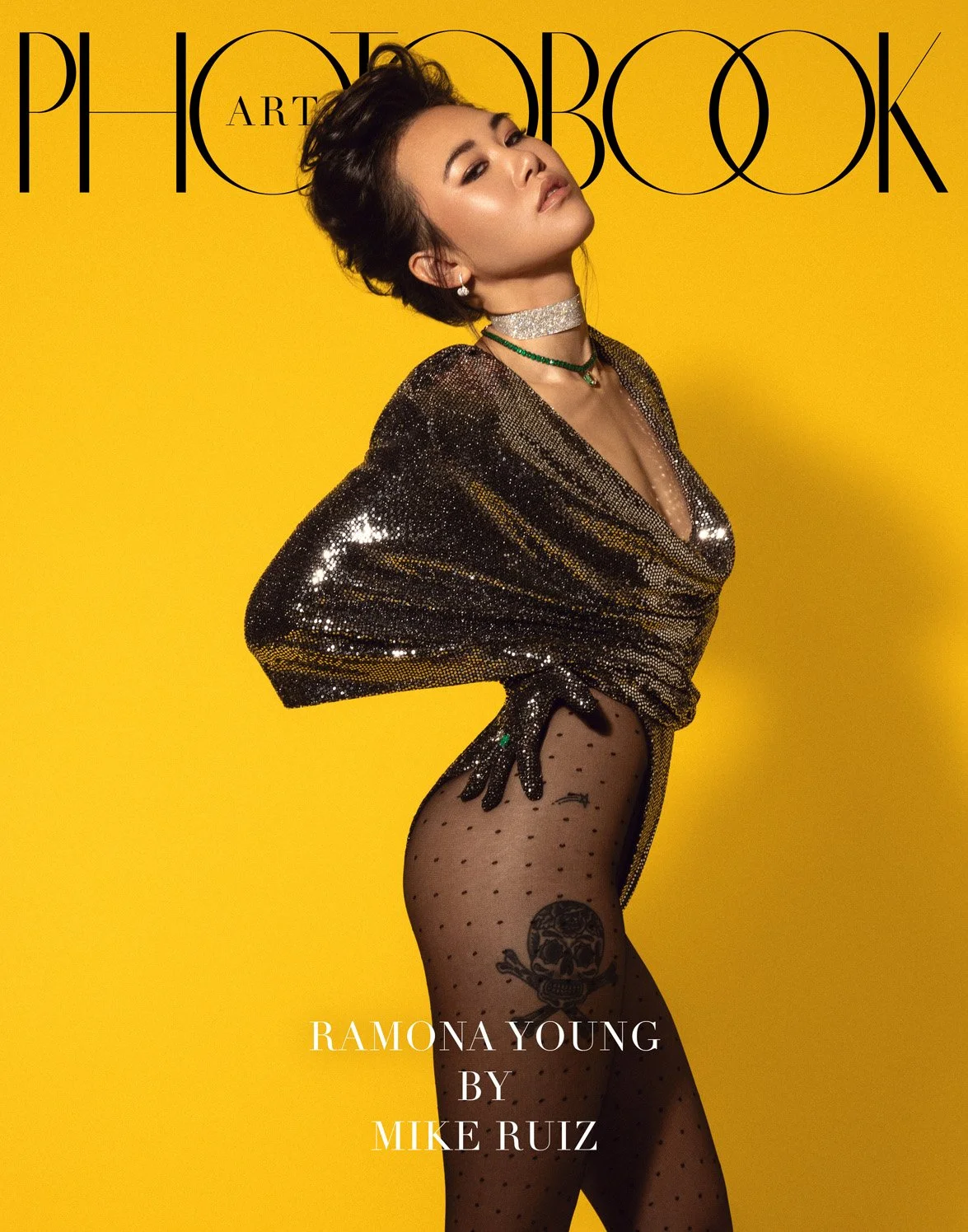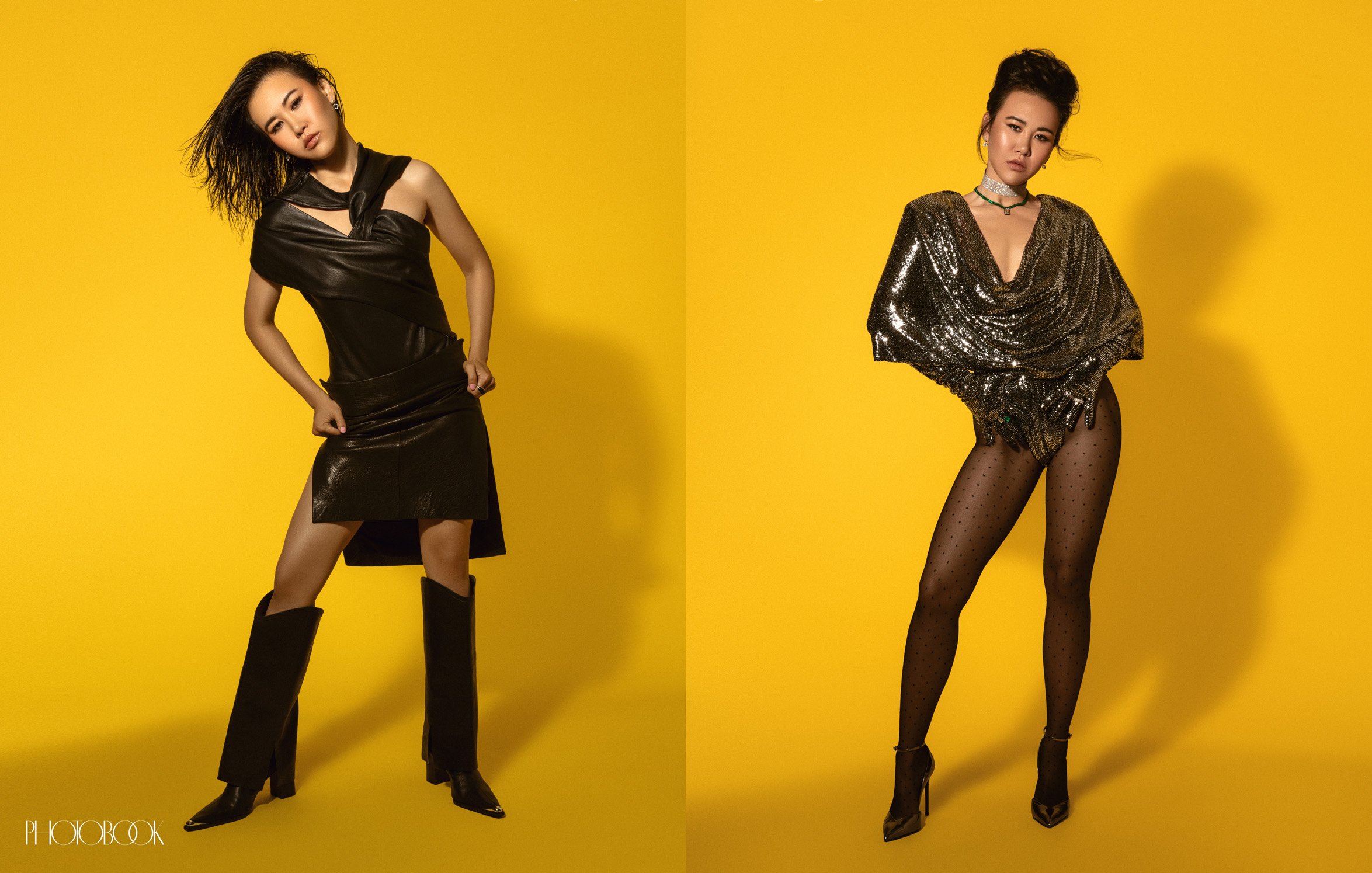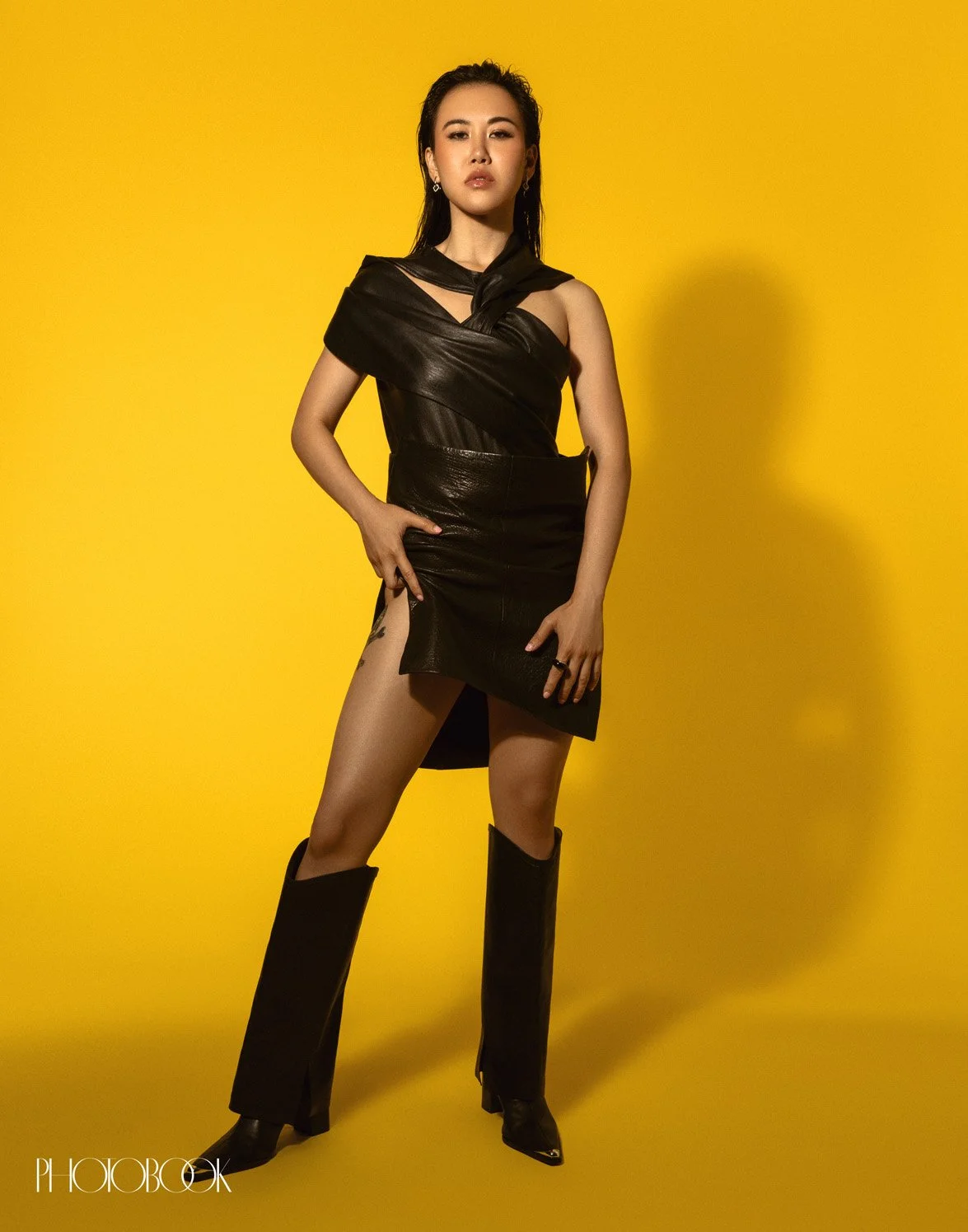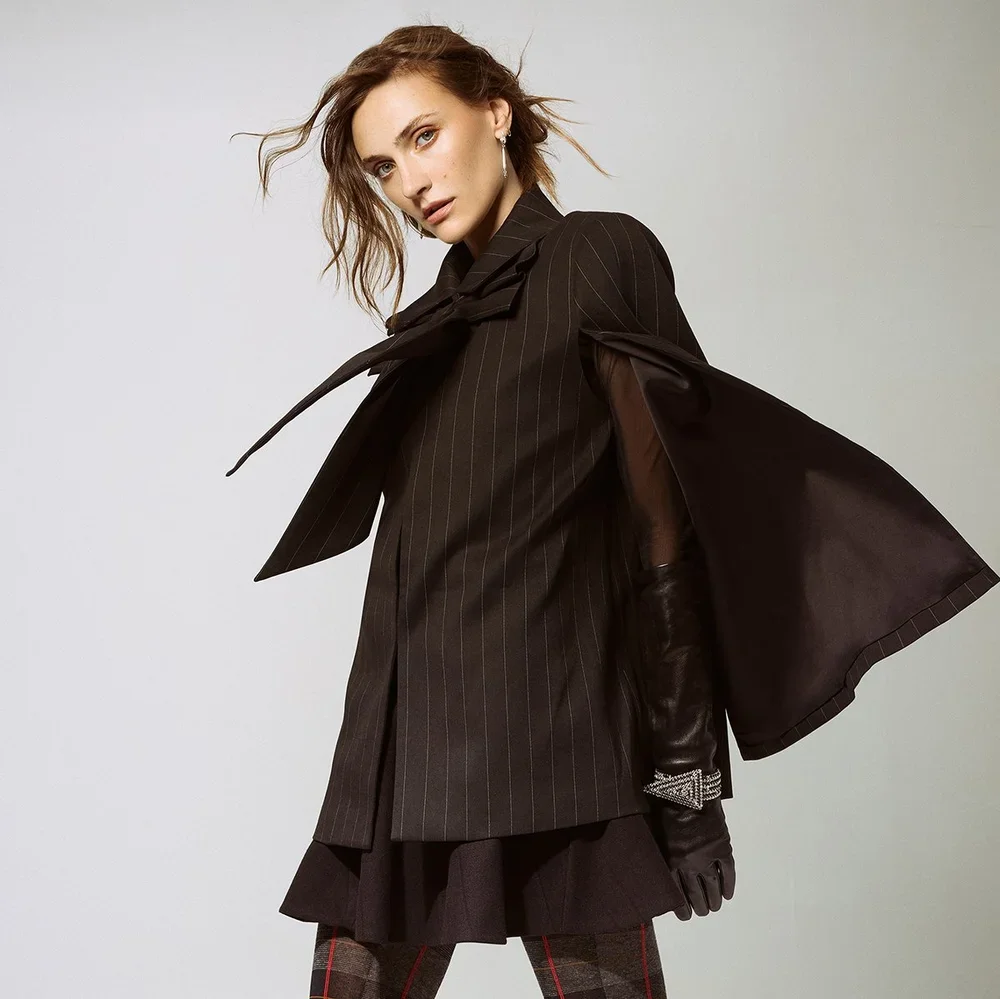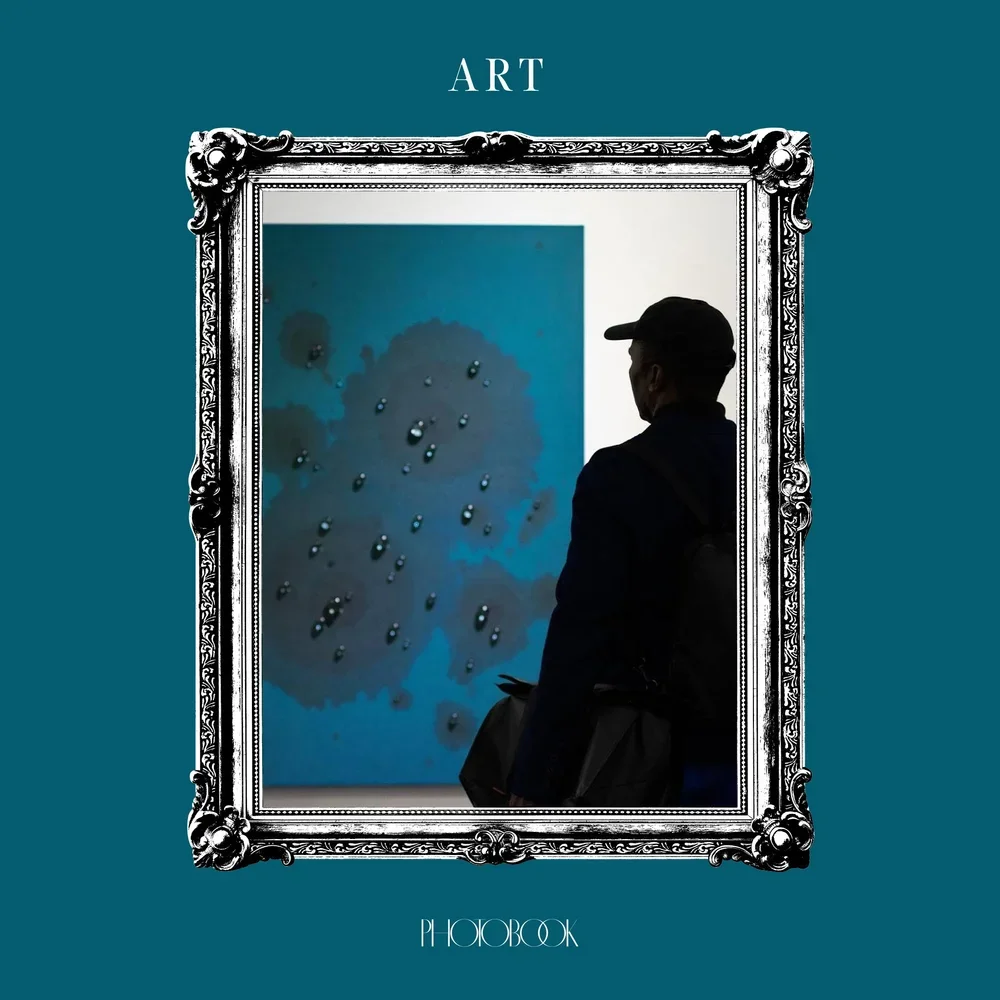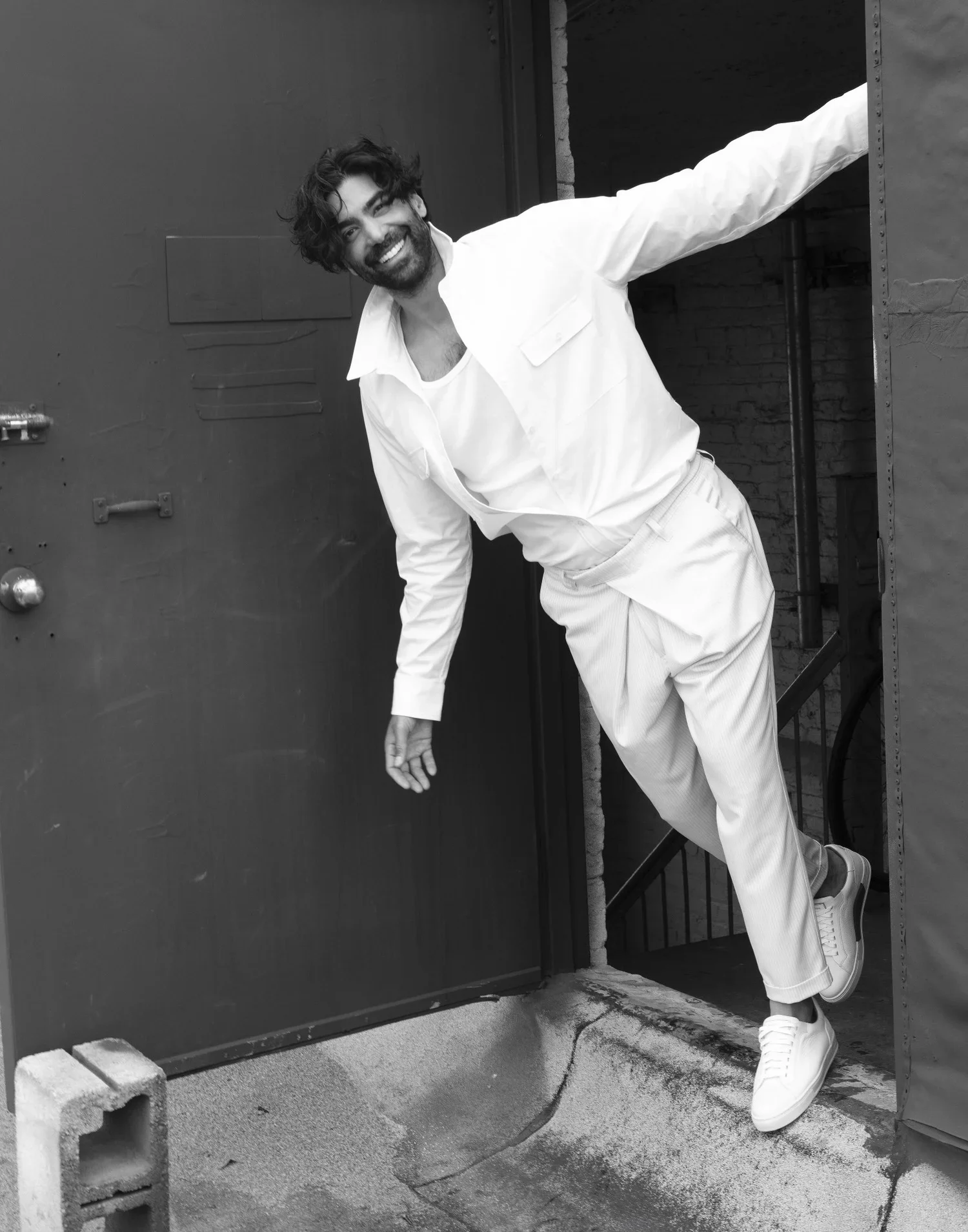Melvin Gregg and Ramona Young, Beyond The Paper
Left:
Jacket by Tell the Truth
Shirt by Dior
Pants by Helmut Lang
Shoes by John Varvatos
Right:
Bolero + Bloomers by Margesherwood
Corset by Vintage Givenchy from Wild West Social House
Heels by Roger Vivier
Rings by Loree Rodkin
MELVIN GREGG
Before becoming a familiar face on television, Melvin Gregg was a pioneer of the viral apps that defined eras of the internet. First on Vine, then YouTube, Gregg learned to write, direct, and edit his own content while instantly testing it against global audiences.
Those years of constant social media creation weren’t just about getting followers or becoming an internet star; they were a crash course in performance that became “the equivalent of theater school,” shaping not just his comedic timing, but his understanding of storytelling, camera work, and character building.
What started as six-second skits, has since evolved into a career spanning drama, comedy, and everything in between. From playing the intense character of Manboy in FX’s Snowfall to stepping back into the mockumentary world with American Vandal, a format he experimented with on YouTube, Gregg is always reinventing himself on screen.
Now, with The Paper, Gregg continues to explore new territory, blending humor, heart, and authenticity in a show that carries both the spirit of The Office and its own unique voice. He’s more than a social media success story—he’s a versatile actor and storyteller whose career reflects not just talent, but vision and resilience.
Shirt and Overcoat by Denzil Patrick
Pants by Kody Phillips
Hat by In the Middle Tulum
As someone who has been on vine, and YouTube, and seen how media has changed throughout the years, how do you think the digital space and social media has shaped your experience as an actor?
Social media helped shape me as an actor, as a director, as a producer, as a writer, as a creative. Being able to create content every day and test it against an audience immediately helped me hone my craft in regards to comedy and just learning and understanding myself and my tools, my voice, my expressions, everything.
Being able to direct myself and edit my content gave me a deeper understanding of what the camera is, where it is and how takes can be edited. The whole scope of creating a performance and character arc was all something I learned doing social media. I like to think my days doing social media are equivalent to someone's theater school or improv troupe. Even though I took acting classes, throughout the course of my stint doing social media, I learned more so on the set, working.
How did it feel to go back to mockumentary style comedy? What was different this time around?
I love the mockumentary style. Before I did American Vandal, I produced my own mockumentary called Melvin Gregg, Life After Vine. I posted it on YouTube and producing it, writing it, editing it, as I just said in the last question, definitely gave me a deeper understanding of the format. I was able to just embrace the character and have fun with it. Returning to the spaces is very cool. “American Vandal” was one of my first TV shows almost seven years ago. I think I've grown as an actor since then.
Being able to just build upon what I was able to do on American Vandal is a picture-perfect scenario.
Left:
Shirt and Overcoat by Denzil Patrick
Pants by Kody Phillips
Hat by In the Middle Tulum
Right:
Full Look by Acne Studios
Boots by Los Altos vintage boot (non-exotic)
The Paper carries a lot of expectations from fans of The Office due to its similar style and setting. How do you embrace this comparison while still showing viewers that Detrick and The Paper bring their own original thing to the table?
Being in the same universe as The Office is amazing. Of course, there's comparison, but you can't expect anything less from an iconic show.
People want to make sure that we live up to the legacy of The Office and that we don't ruin what the show was, what the show was for them. If you're not going to do something just as good, if not better, you probably shouldn't touch it.
And although I wouldn't make a direct comparison to The Office, I think our show is great, although it's different; It shares the same DNA. It has Greg Daniels, who created and served as the showrunner for The American Office, and Michael Coleman as well, who's a great addition to the team, creating the show.
I like to look at it as a sibling show to The Office. It's from the same creator, but it's a little different with different experiences.
Both you and Detrick share a love for DIY projects; on the show Detrick carved a bird for Nicole, and you have built everything from a home theatre to a custom Jurassic Park. Are there any other ways in which you and Detrick are similar?
Yeah, we definitely have a shared love for DIY. Detrick is also a hopeless romantic, and he's someone who would pride himself on being a family man, which I am. That's something we share as well. Me and Detrick share a lot of common attributes, but it was things that I've learned to mask or grow through; like insecurities or feeling anxious or unsure. I've been able to grow through these things where Detrick is still exploring them, but a lot of who Detrick is, I've been able to pull from different chapters of my life.
I don't think I've experienced all of who Detrick is all at one time, but they're all different parts of my life and my experiences. I don't think I'm very similar to Detrick at this point in my life outside of DIY.
I guess he's an aspiring family man. I am a family man, so I guess we wouldn't be similar that way either.
Shirt and Overcoat by Denzil Patrick
Pants by Kody Phillips
Hat by In the Middle Tulum
In what ways do you hope The Paper sticks with the viewers?
I hope The Paper sticks with the viewers the same way The Office stuck with the viewers. If we can get a fraction of the love that the series received, I'd be happy. That show is such a staple in television; the fans are absolutely amazing, and they adore the show so much. If we can replicate that or get close to it, I'll be over the moon.
What is your favorite memory from filming The Paper?
My favorite memory from filming The Paper would probably be myself, Ramona, Chelsea, and Bemi all took a golf cart to the back lot of Universal and just explored, riding around and just having a good time. That was definitely a highlight for me.
You are a very creative individual, in many aspects of your life. Having explored acting, writing, and producing, is there anything else on your To-Do list?
I definitely want to direct. It's something I've done in the past and it's something I feel like I'll be great at and I definitely want to do more of it in the future along with everything else. I want to continue to act, write, produce at higher levels and just do it more often and have access to more material and be in a position to get the material that I create and produce as well.
How do you put your personal spin to the many different characters you play?
My personal spin on many different characters. As an actor, I try to find parallels with the character myself and also the situation the character is in and just try to live in that space as honestly as possible. The only way to really be honest is to pull from actual experiences or things that are natural to me. I'm always trying to justify the character's actions. Yes, the only source I really have to pull from is myself. There's going to always be that common DNA of Melvin in every character. But I try to differentiate the characters as much as possible. I feel like people have a lot of different sides during different chapters of their life. There's a lot to pull from when you live life, and that's what I try to do.
Snowfall marked a turning point in your career. What lessons did you take away from playing “Manboy” and how did working with John Singleton guide you in finding that depth you needed?
Manboy was definitely a character that resonated with audiences, and it was a breakaway from what I had established on Vine. On Vine, I played characters, but they were all silly. They were kind of lighthearted, comedic, and Manboy was the opposite. I was happy to be able to explore their character and show a different side of myself to kind of, I don't want to say wash away the image of Vine, but coming from social media, a lot of times people can't see you outside of how they first met you. Being able to wash that perception away with Man Boy, I feel like it was very important for my career. From there, I think people were able to see me as an actor, it served as a launching pad for many other characters to come. One of the things I learned from playing Man Boy was just relaxing in the moment, having fun, not letting the drama of the situation or the series kind of get to you.
I learned a lot from Damson Idris. He's one of the most technical actors I've ever worked with. And I definitely learned a lot from him during the process of shooting Snowfall. John Singleton just made me comfortable. Having somebody like John co-sign you gives you confidence. He was talking about a movie he had an idea for and wanted me to be a part of. He just really believed in me, and was an advocate for me. To have someone like himself really stand behind me made me feel like I was meant to be here and gave me the confidence to move forward.
Blazer by Walter Mendez
Pants by Saint Laurent
Shoes by Prada
Jewelry by Charlie Lapson
How has being a father changed your outlook on acting and the roles you hope to take in the future?
Being a father definitely changed my outlook on acting. As far as it's not that important; the most important thing to me is being a dad. It alleviates a lot of the pressure of getting jobs and being an actor.
At the end of the day, what's most important to me is that my kids love me and that I'm a role model for them and somebody they could be proud of. I’ll take that over an illustrious movie career any day. In the future I definitely want to do more things that they can see, but it's also a responsibility of being somebody that they can look up to. There's a lot of things I wouldn't do just because I don't want to represent or bring a certain type of character to life because I don't want to live in that space as the actor. And it's just not a story I want to tell or somebody who I'd like to explore their mindset, I'm probably not going to do it because I wouldn't want my kids to see me in that light.
I only have one face. I can't destroy my perception by doing a monstrous character, somebody who's not redeemable, who's just evil for the sake of being evil. I don't know what that character is, but I'm saying it to say that there is a boundary to where I'm willing to go as an actor.
What advice would you share with those who also have multiple passions and refuse to mold to one box?
Don't let anybody mold you or hold you to one box. But I do believe you have to hyper-focus, you have to find that one thing that you're more passionate about than any other and focus on that.
Once you do that one thing well enough, it'll make the other things easier to do. When I was first doing social media and I wanted to act too, I tried to do both and produce social media content, create social media content, run the distribution, the business side of it, and go on auditions and act. It wasn't happening for me. In order to be successful, you have to hyper-focus. I completely stopped doing social media and focused solely on traditional content. From there, I was able to book jobs and start working as a traditional actor.
And being able to do that at a higher level, it'll make it easier for me to write. It'll make it easier for me to get projects screenlit or produced or direct. Even if I want to create social media content on a bigger scale, I think it'd be easier to do it since I've found success as an actor.
I always say you need to hyper-focus on one thing. Not to say you're limited to just that, but you don't want to split your bandwidth between multiple things at the same time because things are going to suffer.
Bodysuit by Death by Dolls
Tights by Fogal
Heels by Alevi
Earrings, necklaces and rings by Shay Jewelry
RAMONA YOUNG
At just fourteen years old, Ramona Young found the courage to chase an acting dream many only dare to label as a “someday.” What began with filming shorts and writing stories with a friend has since grown into a career filled with memorable roles in TV and film projects—from her breakout role on Never Have I Ever to her latest as Nicole in The Paper where she carries the weight of The Office’s devoted fan base.
Moving cities often as a child gave Young a sharp ability to adapt, which now fuels her work as an actress and mental health advocate. Onscreen, Young blends ambition and vulnerability with a quiet power. Offscreen, she champions mental health awareness, experiments with directing, and even graced the runway at New York Fashion Week this past September.
For Young, identity is never fixed—it’s evolving, layered, and always tied to the stories she navigates.
What sparked your passion for acting, and how did you find the bravery to pursue it as a career at just fourteen years old?
I first started thinking about acting when I met an extremely extroverted friend during my freshman year of high school. She adopted me in the midst of moving, and even though we only went to the same school for about one semester before I moved again, her perspective gave me hope for the future. We would film little shorts and write stories together, and that’s really where the spark began.
Now that you have had success in the acting world and been a part of a multitude of successful projects, what would you say to your younger self that took that leap of faith?
Keep dreaming. It’s not too much. It’s not delusional. It’s exactly what you need to make it. Don’t let somebody who’s never had the courage to take that leap persuade you otherwise.
Left:
Top and skirt set by Haider Ackerman via Wild West Social House
Jewelry by Carrera y Carrera
Boots by Margesherwood
Right:
Bodysuit by Death by Dolls
Tights by Fogal
Heels by Alevi
Earrings, necklaces and rings by Shay Jewelry
You are someone who has a lot of experience moving around and adapting to new places from a young age. In what ways has this ability helped you in your acting career?
I don’t think I would have become an actor if I hadn’t lived the life I lived. That part of me that wants to make an impression—to be remembered—wouldn’t exist so deeply. I’d also be far less adaptable to change.
In The Paper, your character seems to kind of self-sabotage her relationships at times. Were there any real-life inspirations you gathered from to make this feel authentic?
No, relationship-wise I’m really different from Nicole. I actually relate much more to Detrick.
Are there any qualities that Nicole has in The Paper that you see in yourself?
Her quiet ambition, her sensitivity beneath the mask, and her weird facial expressions.
As a legacy project, The Paper draws in a bit of extra attention and expectations from viewers, especially those who are fans of The Office. Did you feel any added pressure stepping into this role, and how did you navigate that?
There was really no way to navigate that in real time except to trust the creators, trust my teammates, and do my best. I believed we were creating something electric and magical, but I couldn’t predict the future or how it would be received.
Earlier in September, you walked at the Rachel Antonoff & Susan Alexandra show for NYFW. How was that experience?
It was amazing, and for such a wonderful cause. Rachel’s vision for design is so iconic, and it was so much fun having adoptable puppies running amok.
You have been open about living with bipolar depression. What are some common misconceptions about the condition that you hope to bring awareness to through your work?
I have? Well, it’s true. Sometimes what others label as your greatest weakness—or even the part of yourself you’re most afraid of—can actually become your greatest strength.
Top and skirt set by Haider Ackerman via Wild West Social House
Jewelry by Carrera y Carrera
Boots by Margesherwood
How has your passion for storytelling, directing and acting helped you find your own identity?
I think my identity is an ongoing process. But storytelling, directing, and acting allow me to explore where I am right now.
If you could be a part of another legacy project or sequel type show to any show ever, which one would it be?
I’m still trying to wrap my head around how wonderful this current legacy is. It hasn’t hit me yet.
What sort of legacy are you hoping to leave to younger generations when it comes to mental health?
I’m a huge advocate for mental health. If we continue creating safe spaces to understand and educate on mental health, I think the world would be a better place.
What kind of projects are you hoping to do in the future?
I want to do projects that allow me to better understand myself and strengthen the potential of who I can be.
CREW CREDITS:
Talent: Melvin Gregg and Ramona Young
PhotoBook Editor-In-Chief: Alison Hernon
PhotoBook Creative Director + Photographer + Producer: Mike Ruiz
Stylist (Ramona): Amanda Lim
Hair (Ramona): Ryan Burrell
Makeup (Ramona): Sarah Nelson
Groomer (Melvin): Eliven Rodgers
Stylist (Melvin): Michael Fusco at Exclusive Artists
Photography Assistant: Ozzie Gutierrez
Tearsheets by Daniel López, Art Director, PhotoBook Magazine
Interview by Sabine Obermoller, Contributor, PhotoBook Magazine



